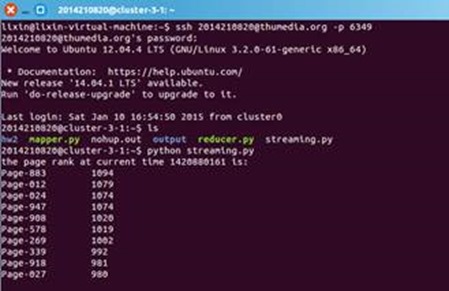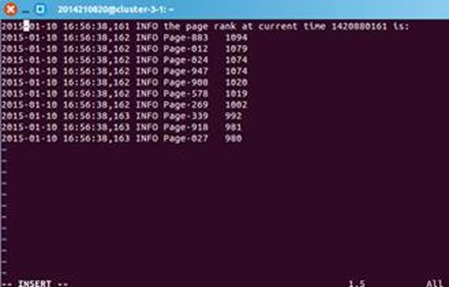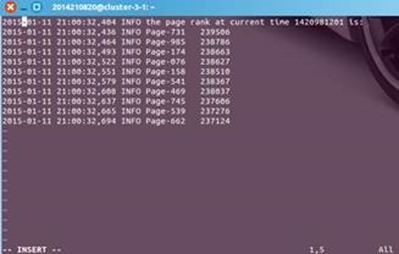流式資料處理
1、直接登陸伺服器:ssh 2014210***@thumedia.org -p 6349
建立streaming.py: touch streaming.py,並且如下編輯:
<span style="font-size:14px;">#! /usr/bin/python import logging import math import time pg2count={} t=1 while 1: fp=open('/tmp/hw3.log','r') for line in fp: line = line.strip() times, page, count = line.split()[0],line.split()[1],line.split()[2] if count.isdigit() & page.startswith('Page-'): try: pg2count[page] = [pg2count[page][0] + int(count),t] except: pg2count[page] = [int(count),t] fp.close() a=sorted(pg2count.items(), key=lambda page:page[1][0], reverse = True) print '%s%s%s' % ('the page rank at current time ',times,' is:') for i in range(0,10): print '%s\t%d' % (a[i][0],a[i][1][0]) logger = logging.getLogger() #set loghandler file = logging.FileHandler("output.log") logger.addHandler(file) #set formater formatter = logging.Formatter("%(asctime)s %(levelname)s %(message)s") file.setFormatter(formatter) #set log level logger.setLevel(logging.NOTSET) logger.info('%s%s%s' % ('the page rank at current time ',times,' is:')) for i in range(0,10): logger.info('%s\t%d' % (a[i][0],a[i][1][0])) time.sleep(60)</span>
2、寫好程式碼之後測試執行:python streaming.py輸出如下:
nohup: ignoring input and appending output to `nohup.out',則表示後臺執行成功,輸出顯示會儲存到nohup.out中,
也可以檢視output.log檔案裡的輸出:
最後我們讓它在後臺一直執行:nohup python streaming.py &輸出:
[1] 8994
一天之後,我們再次檢視結果:
可以看到,累計的結果已經和第一次不太一樣
3、殺掉程序:ps -ef|grep 1020得到如下輸出:
2014210***@cluster-3-1:~$ ps -ef|grep 1020
1020 7512 7471 0 Jan10 ? 00:00:00 sshd: 2014210***@pts/30
1020 7513 7512 0 Jan10 pts/30 00:00:00 -bash
1020 7574 7508 0 20:55 ? 00:00:00 sshd: 2014210***@pts/52
1020 7575 7574 0 20:55 pts/52 00:00:00 -bash
1020 8282 7575 0 21:04 pts/52 00:00:00 ps -ef
1020 8283 7575 0 21:04 pts/52 00:00:00 grep --color=auto 1020
1020 8994 1 0 13:20 ? 00:01:46 python streaming.py
1020 12260 12232 0 Jan10 ? 00:00:00 sshd: 2014210***@pts/35
1020 12261 12260 0 Jan10 pts/35 00:00:01 –bash
輸入kill 8994:
2014210***@cluster-3-1:~$ kill 8994
2014210***@cluster-3-1:~$ ps -ef|grep 1020
1020 7512 7471 0 Jan10 ? 00:00:00 sshd: 2014210***@pts/30
1020 7513 7512 0 Jan10 pts/30 00:00:00 -bash
1020 7574 7508 0 20:55 ? 00:00:00 sshd: 2014210***@pts/52
1020 7575 7574 0 20:55 pts/52 00:00:00 -bash
1020 8335 7575 0 21:05 pts/52 00:00:00 ps -ef
1020 8336 7575 0 21:05 pts/52 00:00:00 grep --color=auto 1020
1020 12260 12232 0 Jan10 ? 00:00:00 sshd: 2014210***@pts/35
1020 12261 12260 0 Jan10 pts/35 00:00:01 –bash
至此,streaming.py執行結束。
Question
How can your design scale when the streaming is large and the calculation is complicated?
答:首先確定每個程式週期需要的時間,然後確定這段時間內的流資料能夠儲存在一塊足夠大的快取區域,等到下個程式週期處理前一個快取的流資料即可。



